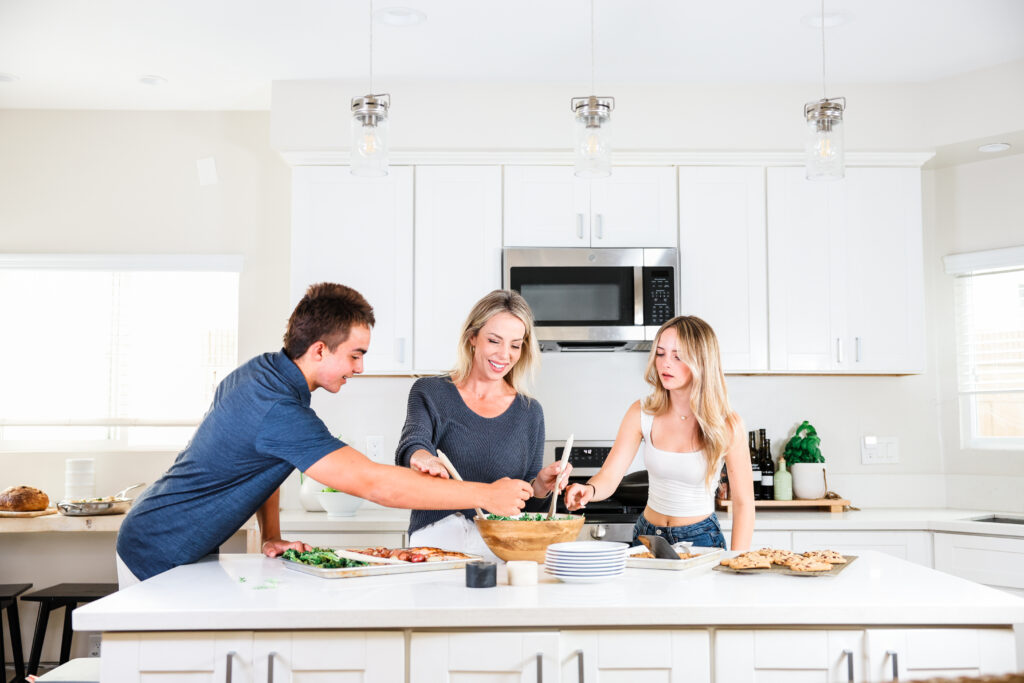
Cooking with kids and teens isn’t just about getting dinner on the table—it’s about creating memories, teaching life skills, and building traditions that can last a lifetime. The kitchen is the heart of the home, where stories are shared, laughter echoes, and lessons are learned. If you’ve ever wondered how to get your kids excited about cooking, here are some tips and encouragement to make the process fun and meaningful.
Start with Age-Appropriate Tasks
When introducing your kids to the kitchen, it’s important to give them tasks suited to their age and ability level. For younger children, tasks like washing vegetables, stirring, or sprinkling ingredients are perfect. Teens, on the other hand, can handle more complex responsibilities like chopping, sautéing, or even following an entire recipe.
Tip: Encourage creativity by letting them make choices. For example, ask your younger child what vegetable they want to add to a salad or let your teen decide on a dinner menu for the week. This builds confidence and helps them feel more engaged in the process.
Emphasize the Importance of Patience & Cleanup
Cooking is a process that requires patience, especially for kids and teens who might be used to quick results. Explain that good things take time and that mistakes are part of learning. And don’t forget about the importance of cleaning up! Teaching kids that cooking includes cleaning the workspace and tools can instill responsibility.
Tip: Make cleaning fun by turning it into a game or challenge—who can wash the most dishes in a certain amount of time, or who can wipe the counters the cleanest?

Create Special Family Recipes Together
One of the best ways to create lasting memories is by developing your own family recipes. Let your kids and teens experiment with different ingredients and flavors, and write down their creations to be enjoyed again. This can become a treasured tradition, where everyone has their “signature dish” that gets passed down through the years.
Encouragement: Cooking with your kids isn’t about perfection; it’s about the experience. Some of the best memories are made when things don’t go as planned—like that time the cake didn’t rise or when too much salt was added to the soup. These moments create stories to laugh about for years to come.
Make It Fun with Themed Cooking Nights
A fun way to keep your kids engaged in the kitchen is by planning themed cooking nights. Whether it’s “Taco Tuesday,” “Pizza Night,” or “Breakfast for Dinner,” giving them a theme gets them excited to be involved in the planning and preparation.
Tip: Rotate the responsibility of who gets to choose the theme each week. This gives everyone a chance to be creative and try new dishes, making it more than just a meal—it’s an event.
Turn Cooking Into a Learning Opportunity
Cooking is a great way to teach your kids essential life skills, from measuring and following directions to understanding nutrition and budgeting. For teens, introduce the concept of meal planning and shopping for ingredients. This helps them understand the value of preparing healthy meals and managing costs.
Encouragement: Cooking together can open the door to conversations about food choices and the benefits of homemade meals. Let them see that cooking isn’t a chore, but rather a fun and rewarding activity.
Celebrate Traditions & Holidays with Cooking
Many family traditions revolve around food, whether it’s baking cookies for the holidays, making grandma’s famous lasagna, or having a backyard BBQ in the summer. Include your kids and teens in these traditions, explaining why certain recipes are meaningful. Allow them to take part in the preparation so they can feel a connection to the family’s culinary history.
Tip: Create new traditions with your kids. Perhaps it’s a special birthday breakfast or a Friday night family pizza-making contest. The key is consistency and making it something everyone looks forward to.

Praise Effort, Not Perfection
Kids and teens can be hard on themselves, especially if a recipe doesn’t turn out the way they hoped. Be sure to praise their effort and the process, even if the result isn’t Instagram-worthy. Cooking together should be fun and relaxed, not stressful.
Encouragement: Highlight what they did well—whether it’s their creativity in choosing flavors or their patience in following the recipe. By focusing on the positives, you’ll build their confidence and keep them excited about cooking.
Make Time for Family Meals
After all the fun of cooking, the reward is sitting down together as a family to enjoy the meal. Family dinners foster connection and communication, and kids are more likely to eat what they helped prepare. It’s the perfect opportunity to teach gratitude, talk about the day, and share stories.
Encouragement: Even if life gets busy, try to set aside at least one or two nights a week for family dinners. These moments around the table are priceless, and your kids will remember them long after they’ve grown.
Cooking with your kids and teens can be one of the most rewarding experiences as a parent. It’s a chance to pass down life skills, create traditions, and make lasting memories. Whether you’re whipping up a quick weeknight dinner or preparing a holiday feast, the time spent together in the kitchen is about so much more than food—it’s about love, connection, and the joy of being together.